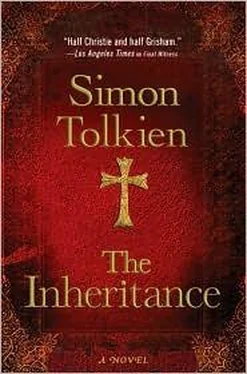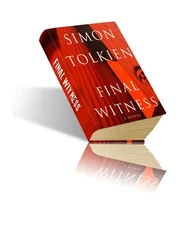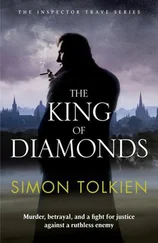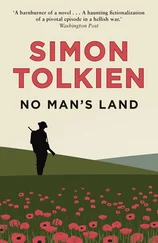Simon Tolkien - The Inheritance
Здесь есть возможность читать онлайн «Simon Tolkien - The Inheritance» — ознакомительный отрывок электронной книги совершенно бесплатно, а после прочтения отрывка купить полную версию. В некоторых случаях можно слушать аудио, скачать через торрент в формате fb2 и присутствует краткое содержание. Жанр: Полицейский детектив, на английском языке. Описание произведения, (предисловие) а так же отзывы посетителей доступны на портале библиотеки ЛибКат.
- Название:The Inheritance
- Автор:
- Жанр:
- Год:неизвестен
- ISBN:нет данных
- Рейтинг книги:4 / 5. Голосов: 1
-
Избранное:Добавить в избранное
- Отзывы:
-
Ваша оценка:
- 80
- 1
- 2
- 3
- 4
- 5
The Inheritance: краткое содержание, описание и аннотация
Предлагаем к чтению аннотацию, описание, краткое содержание или предисловие (зависит от того, что написал сам автор книги «The Inheritance»). Если вы не нашли необходимую информацию о книге — напишите в комментариях, мы постараемся отыскать её.
The Inheritance — читать онлайн ознакомительный отрывок
Ниже представлен текст книги, разбитый по страницам. Система сохранения места последней прочитанной страницы, позволяет с удобством читать онлайн бесплатно книгу «The Inheritance», без необходимости каждый раз заново искать на чём Вы остановились. Поставьте закладку, и сможете в любой момент перейти на страницу, на которой закончили чтение.
Интервал:
Закладка:
“In bloody Marjean. And I don’t know why.”
“Can’t you ask her?”
“She’s disappeared.”
Clayton whistled. “There’s bad news about the home secretary, I’m afraid,” he said after a moment. “The defence barrister rang here yesterday, looking for you. He called to say the minister refused the reprieve. He seemed pretty upset-said something about the old bastard not knowing the meaning of the word. The execution’s on Wednesday morning at eight. Same as before.”
“Can’t we take this statement from the locksmith to the Home Office?” Clayton asked anxiously when Trave stayed silent at the other end of the phone. “The name and the car link up with the Mercedes that was stopped on the murder night.”
“It’s not enough,” said Trave flatly. “The man in the Mercedes could just as well have been Stephen’s accomplice as anyone else’s. I’ve got a couple more people to talk to here, but if nothing comes of that, I think we’ve had it, Adam. There’s no point in pretending. We’re damn near played out.”
“Don’t say that. Something’ll turn up.”
Trave said nothing. He suddenly realised that he wanted to cry, but he couldn’t. He’d felt the same after Joe died. It made him hate himself.
“I’ll call you on Monday,” he said finally and was about to put the phone down, when Adam spoke again.
“When are you going to come back?” he asked. “Creswell wants to know.”
“Tell him Monday night,” said Trave. “I’ll know one way or the other by then.”
After the call was over, he stayed by the telephone, tempted to ring the airlines and book the earliest flight home. But he didn’t. He knew that there was nothing to be gained by going back. Only evidence could help Stephen. And he felt sure that there was evidence here, if only he could find it in time.
Trave remembered his father telling him when he was a boy that there was only one way to untie a knot, and that was to go back to the beginning. And the beginning was in one of these towns. Moirtier or Marjean. He felt the thread just beyond the tips of his outstretched fingers, but try as he might, he couldn’t get hold of it. The Frenchman and his accomplice were out there somewhere, waiting for the final chapter to unfold, and he was here, alone and confused, with three days left to find out who killed John Cade. And one of these days was a Sunday.
Trave sat at the back of Marjean Church during the Mass. It was in Latin and the liturgy was far removed from the Book of Common Prayer that he was used to in his Anglican church at home. Unexpectedly, it lifted his spirits. Deum de deo. Lumen de lumine. Deum verum de deo vero. The singing reached into the rafters, mixing with the incense, muffling the sound of the rain beating against the windows, and Trave prayed to this unfamiliar Latin God to show him the way, to save an innocent boy from another Calvary. At the end he put a coin in the iron box by the door and lit two candles, one for Joe and one for Stephen, and then he waited while the congregation filed out into the rain and the cure changed out of his lawn-green surplice in the vestry.
He was a young man in his early thirties with a long, angular face and wide open, bright blue eyes: a complete contrast to the shifty-looking landlord of the village inn on the other side of the lake. And he appeared entirely unruffled by the presence of an English policeman in his church who had obviously come to ask him questions. Without needing to be asked, he told Trave about the padlock on the door that had been cut the day before, but he had no idea what the intruder had been looking for. Nothing was missing from the church, and he had never heard of a young Englishwoman called Sasha Vigne.
The cure insisted on giving Trave a guided tour of the church.
“It’s one of the oldest in Normandy,” he said. “And we get people coming from all over France to look at the tombs. But then the chateau is a disgrace. It just falls down stone by stone, and no one lifts a finger to stop it. They say the government owns the place, but they’re not interested. Until some child gets killed by a falling mansard, of course. Then they’ll do something.”
“Where are the tombs?” asked Trave, in an effort to distract the cure from the subject of the ruined chateau, which was obviously his personal bete noire.
“Down in the crypt,” said the cure, leading Trave through the vestry and down the narrow, winding stairs. “There was a monastery here once and this is where they buried their abbots.”
“And isn’t it true that the owners of the chateau were killed here at the end of the war?” asked Trave, interrupting. He wondered whether he had shown too much eagerness to move the conversation on to what he really wanted to talk about, but the cure seemed perfectly happy to change the subject.
“Yes, it was a terrible thing. Madame Rocard and the old manservant were killed down here,” said the cure, pointing to the middle of the stone-flagged floor. “Her husband died upstairs. He was probably trying to stop the Germans from bringing them down here, although I’ve never understood why they wanted to do that in the first place. Maybe the Nazis wanted to ask them questions, turn the place into one of their torture chambers. But they’d been camped out in the house for the best part of two years. Plenty of opportunity to interrogate the Rocards in that time, instead of waiting until the day of their departure when the British and Canadians were just up the road.”
“What were they like? The Rocards?” asked Trave. Suddenly they seemed very close. He didn’t know why, but he felt more certain with every passing day that the murder of this middle-aged French couple in the summer of 1944 was the key to everything else. It was as if he needed to find out who killed them if he was ever going to discover who murdered John Cade fifteen years afterward.
“I can’t tell you much about them, I’m afraid,” said the cure apologetically. “I only got appointed to this parish two years ago, and so they were before my time. And no one seems to want to talk about them for some reason. I don’t know why. Maybe people think they were collaborators. Memories tend to be long in places like this.”
“Did the Germans kill everyone? Were there any survivors?” asked Trave, trying to keep the eagerness out of his voice. This was after all the question he’d come to ask.
“No, I don’t think so. The Rocards had a little girl, but she died with the servant’s wife in the house when the Germans set fire to it before they left.”
“What about any other relatives? Anyone who might bear a grudge because of what happened?”
“No. None that I know of. Of course, it’s not the only time there’s been violence here. An Englishman was shot just outside the entrance door three years ago. But they never found out who did it, or whether it had anything to do with what happened here before. The inspector over at Moirtier said that the victim and his friend weren’t exactly helpful, but I don’t know the details. You know, he’s the man you want to talk to if you want to find out more about the Rocards. Marcel Laroche is his name. He’s been a policeman in this area since before the war. There’s very little that happens in Marjean or Moirtier that he doesn’t get to hear about. And now I’ve got to go, I’m afraid. I say Mass in Moirtier at eleven. Having two churches to look after doesn’t make my life that easy sometimes, although I mustn’t complain. This is a beautiful church.”
The cure ushered Trave out the door with a smile and then bent down to attach a brand-new padlock to the handles.
“That ought to keep the vandals out,” he said in a satisfied tone as he raised a big clerical black umbrella above their heads, sufficient to shelter Trave as well as himself from the heavy rain. They went down the hill in a huddle, and the cure held the umbrella up high for Trave as he got into his car.
Читать дальшеИнтервал:
Закладка:
Похожие книги на «The Inheritance»
Представляем Вашему вниманию похожие книги на «The Inheritance» списком для выбора. Мы отобрали схожую по названию и смыслу литературу в надежде предоставить читателям больше вариантов отыскать новые, интересные, ещё непрочитанные произведения.
Обсуждение, отзывы о книге «The Inheritance» и просто собственные мнения читателей. Оставьте ваши комментарии, напишите, что Вы думаете о произведении, его смысле или главных героях. Укажите что конкретно понравилось, а что нет, и почему Вы так считаете.












